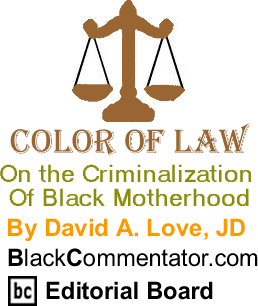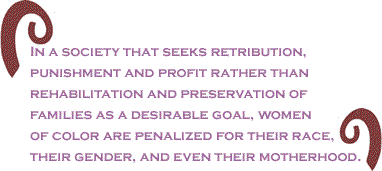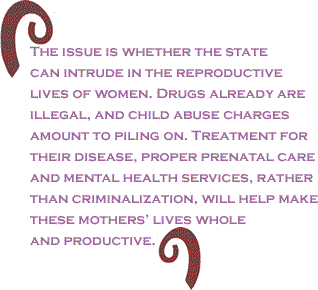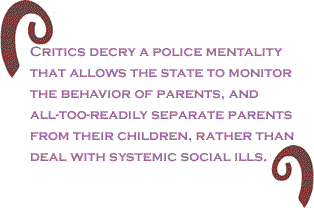
|
||||||||||||||||||||||
 |
||||||||||||||||||||||
 |
||||||||||||||||||||||
 |
||||||||||||||||||||||
 |
||||||||||||||||||||||
 |
||||||||||||||||||||||
 |
| The current issue is always free to everyone |
|
|
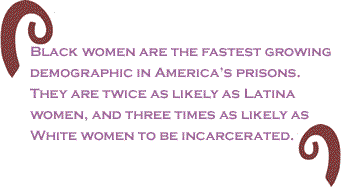 |
On this Mother’s Day, it is fitting that we take time to think of all of the mothers, disproportionately poor, and disproportionately of color, who are behind bars in the United States. Victims of a failed war on drugs, pawns in a for-profit prison scheme that requires more and more warm bodies, locked up, to boost the bottom line, Black women are the fastest growing demographic in America’s prisons. They are twice as likely as Latina women, and three times as likely as White women to be incarcerated. Meanwhile, according to the Bureau of Justice Statistics in 2000, African American children (7.0%) were almost nine times as likely to have a parent in prison as White children (0.8%), while Latino children (2.6%) were three times as likely as white children to have a parent in prison. And in a related matter, according to the Children’s Defense Fund at least 58 percent of children in foster care are children of color. Of this, Black children are 35 percent of children in foster care, even though they are only 16 percent of the population. Latino children make up 17 percent of foster children; 2 percent of the foster care population are American Indian/Native American children, although they represent only 1 percent of the general population, and 1 percent is Asian Pacific Islander. In a 2002 opinion in Nicholson v. Scoppetta—which involved a class action suit by battered women against New York City’s unjust child welfare policies— federal district Judge Jack B. Weinstein characterized the excessive removal of children from their homes as “a form of slavery.” According to Northwestern University law professor Dorothy Roberts in a Colorlines magazine article, the role of racism in the child welfare system is a national disgrace: “Most white children who enter the system are permitted to stay with their families, avoiding the emotional damage and physical risks of foster care placement, while most black children are taken away from theirs. And once removed from their homes, black children remain in foster care longer, are moved more often, receive fewer services, and are less likely to be either returned home or adopted than any other children.”
In a society that seeks retribution, punishment and profit rather than rehabilitation and preservation of families as a desirable goal, women of color are penalized for their race, their gender, and even their motherhood. Women of color are more likely than White women to be monitored and supervised by the state, and more likely to experience state control over their bodies and their children. Call it a holdover from slavery, when Black women had no right to privacy, were violated at will, and could not make decisions regarding themselves, their bodies or their families.
South Carolina was the first state to uphold the criminal conviction of a woman who has taken drugs while pregnant. In South Carolina v. Whitner (1997), that state’s highest court affirmed that child abuse laws apply to the behavior of a mother while the fetus is in her womb, and she may be prosecuted for harm to her viable fetus. In 1992, Cornelia Whitner was sentenced to eight years for unlawful child neglect— smoking crack cocaine during her pregnancy. In 1989, a group of prosecutors in South Carolina, in cooperation with the police and public hospitals, decided to start punishing pregnant women who test positive for cocaine—most of them African American women who sought prenatal care. Proponents claimed the law was designed as a “family-friendly” measure to stop pregnant women from abusing drugs and to improve the health of the baby. Studies have shown the opposite: Such laws deter women from seeking prenatal care and the limited drug treatment that is available because they are afraid of going to jail.
Cocaine is by no means the leading cause of birth defects. Alcohol abuse is responsible for more birth defects. Tobacco is particularly damaging, as is poverty, malnutrition, stress and exposure to lead. And the prosecution of pregnant women for drug use takes us down a slippery slope that leads to a logical conclusion of criminalizing alcohol and tobacco use. But the issue is not a pregnant woman’s right to take drugs, but whether African Americans are accorded the same constitutional rights as everyone else. The issue is whether the state can intrude in the reproductive lives of women. Drugs already are illegal, and child abuse charges amount to piling on. Treatment for their disease, proper prenatal care and mental health services, rather than criminalization, will help make these mothers’ lives whole and productive. And as the Drug Policy Alliance has reported, “removing a child from his family may cause serious psychological damage - damage more serious than the harm intervention is supposed to prevent.” Critics decry a police mentality that allows
the state to monitor the behavior of parents, and all-too-readily
separate parents from their children, rather than deal with
systemic social ills. “Child welfare policy and practice in
the United States can't be understood fully in Malissa Ann Crawley, a mother of three healthy children, was one of the women prosecuted under the South Carolina law who petitioned the U.S. Supreme Court. She was sentenced to five years for testing positive for cocaine during pregnancy. At Crawley’s hearing, the judge remarked: “I’m sick and tired of these girls having these bastard babies on crack cocaine and until they change the law, the law they gave me, it said I could put them in jail.”
The Drug Policy alliance also noted that the Whitner decision “gave law enforcement a green light to arrest and prosecute pregnant women for child abuse who suffered from drug and alcohol dependence. The decision also opened the doors for prosecuting women for homicide by child abuse, as in the case of South Carolina vs. Regina McKnight.” Also commenting on the devastating effect of Whitner, National Advocates for Pregnant Women says that infant mortality in South Carolina increased for the first time in a decade. In addition, the state has experienced a 20 percent increase in abandoned babies, and there has been a dramatic decline in the number of women seeking drug treatment program services. The U.S. Supreme Court refused to hear the Whitner case on appeal. But in 2001, the nation’s highest court decided in Ferguson v. City of Charleston that a public hospital violated the Fourth Amendment of the Constitution by performing drug tests on women, and reporting the results of the tests to the police without the woman’s consent. Nevertheless, the criminalization of women struggling with addiction continues with the promulgation of unjust laws. Punishing pregnant women for their addiction is unconscionable public policy. Locking up the mother, purportedly to save the baby, is primarily a violation against the Black mothers who are targeted, as well as their families and communities. But ultimately, it is an attack on us all. BlackCommentator.com Editorial Board member David A. Love, JD is a lawyer and journalist based in Philadelphia, and a contributor to the Progressive Media Project, McClatchy-Tribune News Service, In These Times and Philadelphia Independent Media Center. He contributed to the book, States of Confinement: Policing, Detention, and Prisons (St. Martin's Press, 2000). Love is a former Amnesty International UK spokesperson, organized the first national police brutality conference as a staff member with the Center for Constitutional Rights, and served as a law clerk to two Black federal judges. His blog is davidalove.com. Click here to contact Mr. Love.
|
Your comments are always welcome. e-Mail
re-print notice
If you send us an e-Mail message we may publish all or part of it, unless you tell us it is not for publication. You may also request that we withhold your name. Thank you very much for your readership. |
|
| May
8, 2008 Issue 276 |
|
| Executive Editor: Bill Fletcher, Jr. |
| Managing
Editor: |
| Publisher: Peter Gamble |
| Est. April 5, 2002 |
| Printer Friendly Version in resizeable plain text format format or pdf format. |
 |
 |
 |
| |
| |





















